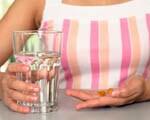Women who take hormone replacement after menopause are at high risk of developing kidney stones. It doesn't mean that women should stop taking hormone therapy based on this fact.

Five to 7 percent of postmenopausal women suffer from kidney stones. Kidney stones aren't just extremely painful when they are passed out of the bladder; people who have kidney stones over time tend to have more kidney damage.
Previous studies on the relationship between hormone therapy and kidney stones have had mixed results. To investigate, researchers reviewed data from the Women's Health Initiative, the largest-ever randomised controlled trial of hormone therapy for postmenopausal women. Their analysis included 10,700 postmenopausal American women who had undergone hysterectomy and were randomly assigned to take oestrogen or placebo, and another 16,600 who hadn't had hysterectomies and were put on either oestrogen and progestin or placebo. Women in the first group were followed for nearly six years, while the women in the second group were followed for seven years.
It was found that women on oestrogen or the oestrogen-progestin combination were 21 percent more likely to develop kidney stones during the follow-up period. When the researchers limited their analysis to women who didn't quit taking their medication during the study period, kidney stone risk was 39 percent greater with the hormones.
Given a woman's baseline risk for developing kidney stones of 7 percent, the study's results meant that a postmenopausal woman's risk rises to 8.5-10 percent when taking hormone therapy. The process by which kidney stones form is complex and has both environmental and genetic roots; there are also several points in this process that could be affected by oestrogen. Drinking plenty of fluids can help prevent kidney stones, while eating too much salt or too much protein can make them more likely to develop.
DoctorNDTV is the one stop site for all your health needs providing the most credible health information, health news and tips with expert advice on healthy living, diet plans, informative videos etc. You can get the most relevant and accurate info you need about health problems like diabetes, cancer, pregnancy, HIV and AIDS, weight loss and many other lifestyle diseases. We have a panel of over 350 experts who help us develop content by giving their valuable inputs and bringing to us the latest in the world of healthcare.












